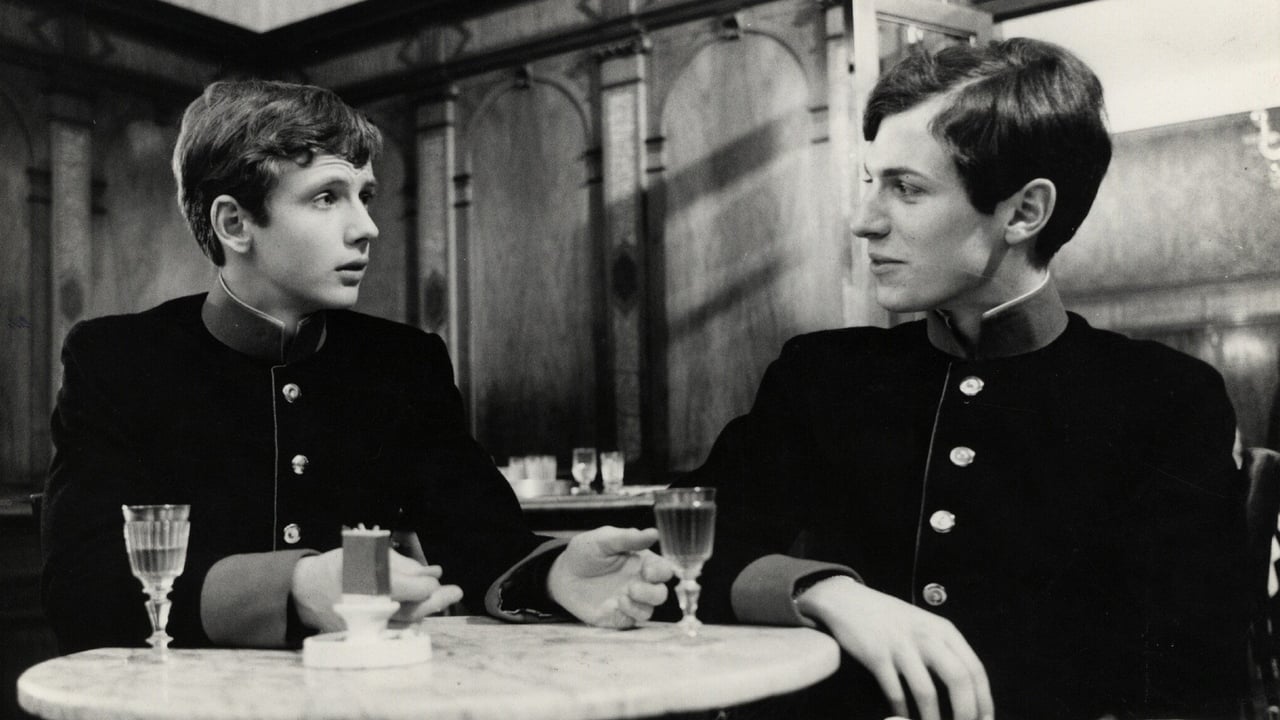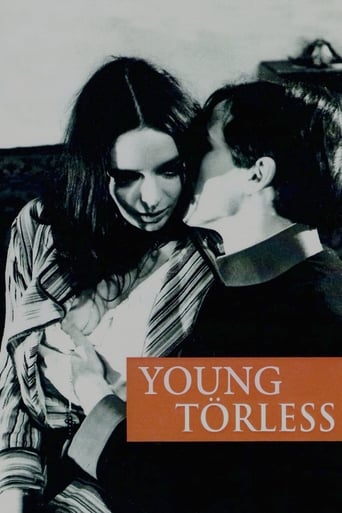

1. It's been said here that the gay content of the story has been removed. Well, the novel was released in 1905. We can nowadays interpret elements of the story in a gay context, but back then these notions did not exist. If Schlöndorff hints at homosexuality as an element of perversion, that is in fact faithful to the novel, which takes a strictly observatory, non-participating stance.2. 'Törless' is often interpreted as an indicator of upcoming intolerance and Nazidom. Again, the novel was released at a much too early time to allow for such an interpretation; the novel's author Robert Musil certainly envisioned the inevitable fall of an empire stuck to tradition and incapable of accommodating personal liberties. Schlöndorff pushes some of the juvenile delinquents into similarities with the Nazis - albeit being carefully ambiguous about it -, but it would be wrong to consider this interpretation as a part of the original narrative.3. 'Törless' is a highly psychological tale and film - again, Schlöndorff proves faithful to the novel in this respect. But this comes with the weakness of constructing characters around a certain social concept. It would be misleading to consider Törless and his rebellious friends as typical representatives of their era, or real figures upon which the author based his characters. As may be more obvious in Musil's masterpiece, 'The Man without Qualities', his characters are crafted to evoke rather a situation than a person; that makes his books almost impossible to adapt correctly.Schlöndorff's film is somewhat middlebrow; it does not intend to be a substitute for reading the novel, but at the same time it carefully avoids to give the impression that it is anything but a rendition of it. That's not quite true; the interpretation is in the framing, the omissions of the subtext, and that the ideas upon watching the film differ considerably from those you get when you read the novel. One may call it therefore a failure - but an interesting failure to watch.
... View MoreWhat's interesting about this film is the way it unapologetically removes the true and original gay content from the story. Torless has a passionate gay affair in the original. In the film gayness is alluded too as perhaps a contributing factor to the corruption of innocents via the pursuit & discovery of knowledge & experience. As a gay person with a broad understanding of the systematic exclusion and removal of gay people from history, the main theme of the film, re: the brutality , sadism and masochism & manifestation of fascism is somehow deeply compromised by the idea that it is excusable, if not absolutely impossible to reveal Torless's gay self as a positive and actual fact of his boyhood because it would offend European bourgeoisie taste of the 60s. So the sensationalism of fascism is portrayed and the recent anti-Semitic WW11 history of Austria 'allowed' as an allusion to it's part in Nazi history, but homosexuality is still being demonised and censored in a film which purports to be about anti-fascism. I don't buy that - and we've all been robbed of the true story - where Torless , far from being a dried up , cold 'acceptably' moral and suggestively straight prude, in the real story embraces the presence of gay feelings rampant in the original story and which contribute to the whole process of his crisis about morality which the film hijacks to portray a censored and acceptable message of it's own.
... View Morepeople should not be distracted about the specifics of the plot,or the tangential,secondary themes of cruelty/sexuality..schlondorf has made his metaphor clear and passionate..people in positions of power(due to talent,wealth,titles of authority,physical stregnth,etc)are not entitled to abuse others,no matter what their alleged justification;and people who witness such abuses and do nothing are worse than enablers, they are accomplices..the obvious association is with the Nazis,but this is a universal problem that could be likened to the Spanish inquisition,the salem witch trials,the torture of prisoners during the iraq war,the red scare hearings and countless others..my own feel is that torless is held up as someone who contributes mightily to this particular evil,but fools himself into thinking he's not involved..his final speech was a lame attempt to justify his conduct..the film may not have been entertaining,but it was thought-provoking
... View MoreThe movie won an award at the Cannes Film Festival when it was first released and signaled the beginning of a German cinematic revival. The book was written in 1906 and is a tedious read, although thankfully a short book. Homosexuality plays a large role in the book but virtually does not exist in the movie. Torless, a horny teenager in an all boys school, eventually has a torrid sexual affair with one of the students. The movie chooses to ignore this, and maybe for good reason as it was released in I believe in 1966. Filmed in black and white, the lack of color contributes to the atmosphere of German austerity that director uses to his advantage. The final speech by Torless is a brilliant defense for the lack of opposition by the middle class to the rise of Hitler. Most of the teenagers in the movie were not aspiring actors but were chosen almost at random for their roles. But considering the time in which it was produced this is a land mark film, especially for German cinema. The movie is much more entertaining than the book and the director,Volker Schlondorff, did a fabulous job and deserves the awards it was given.
... View More